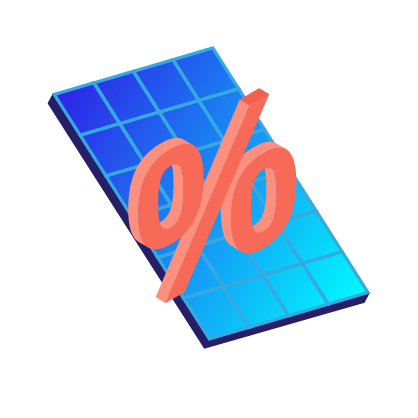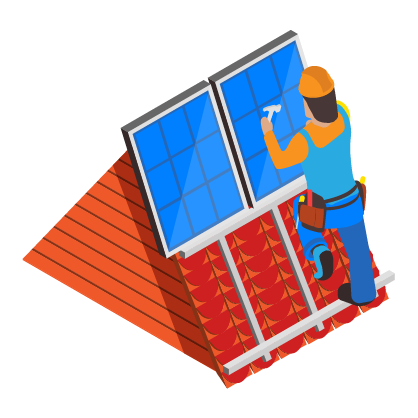Solar Panel Warranty Guide: What You Need to Know
Going solar is a long-term investment energy savings and a clean energy future. And there’s nothing to protect that investment like a long and robust solar panel warranty.
In order to get the most out of your investment, it’s important to know how solar panel warranties work and what types of warranties are available.
In this article, we’ll cover:
- Types of solar panel warranties
- How to monitor your solar panels
- How to make a solar panel warranty claim
- Frequently asked questions
Let’s dive right in by identifying the two main types of solar panel warranties.
Types of solar panel warranties
There are two basic types of warranties that cover solar panels.
- A product warranty protects you from defects in a solar panel stemming from material quality or manufacturing errors. This is also referred to as an equipment or materials warranty
- A performance warranty guarantees that a panel will maintain a certain percentage of its original power output over a period of time. This is also known as a power output warranty.
It’s important to note that warranties vary by manufacturer, location, and panel type. We’ll provide some general information about product and performance warranties below, but it’s best to refer to the manufacturer for specifics.
Solar panel product warranty
Solar panel product warranties protect you from defects stemming from material quality or manufacturing errors.
Defects covered by a product warranty are typically immediately apparent, and your installer will likely catch them before the panel is even installed. However, it may also include less visible issues like premature wear, faulty wiring, and corrosion.
The length of a product warranty varies based on the manufacturer and model. Traditionally, these warranties typically last 10-15 years, although it is becoming more common for premium panels to have 20 and 25 year product warranties.
If a panel fails within the warranty period, the manufacturer will typically replace or refund the panel. Some product warranties also cover the labor and shipping costs and others don’t.
Solar panel failures are very rare. In fact, a study by the National Renewable Energy Laboratory (NREL) found that just 5 in 10,000 modern solar panels fail – a rate of 0.05%. However, solar panels are an investment worth protecting with a solid product warranty.
Solar panel performance warranty
While a product warranty protects you from defective equipment, a performance warranty ensures that solar panels maintain a certain level of output throughout their lifetime, typically 25 years.
Like anything exposed to the elements, solar panels naturally degrade over time. As they degrade, their ability to generate electricity diminishes.
A performance warranty guarantees a maximum level of degradation – typically between .25% and .75% – per year so that in 25 years the panel will still have 80-90% of the power output it did in its first year.
25-year performance warranty example
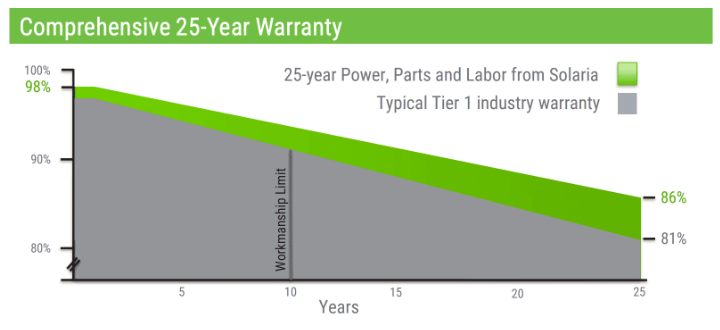
Performance warranties are important for sizing solar systems to maintain 100% offset for 25 years.
It’s important to note that the performance warranty guarantees the panel’s ability to produce a certain amount of electricity – not that the panel will produce that amount. However, if you notice a decline in performance in a properly installed panel with adequate sunlight, your performance warranty should apply.
Solar panel warranties by manufacturer
As we mentioned above, product and performance warranties vary from manufacturer to manufacturer, and model to model.
Here’s a quick glance at the warranties for some of the most popular solar panels sold through the solar.com network:
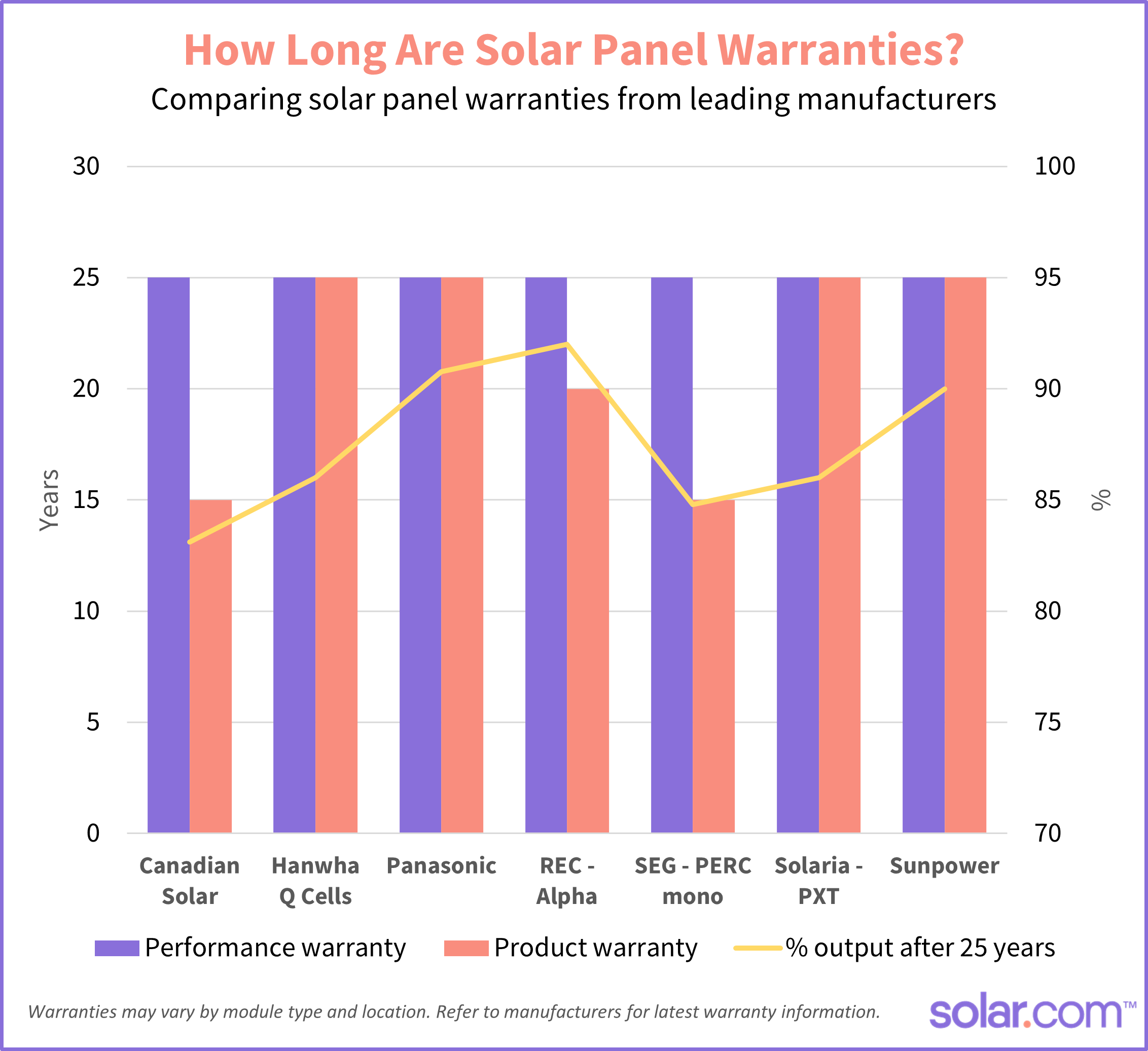
Other solar warranties
In addition to product and performance warranties from solar panel manufacturers, you should also be aware of installer warranties and warranties through marketplaces like solar.com.
Installer warranties
There are two types of installer warranties to be aware of, although not all installers offer both.
- Installer workmanship warranty
- Performance guarantee
An installer workmanship warranty covers damages and defects caused during the installation process. This ensures that your solar system is installed correctly and you won’t foot the bill for any damages done by the installers.
Installer workmanship warranty periods can range from 10-25 years.
An installer performance guarantee ensures that the system produces a certain amount of electricity over the warranty period. So if your system was designed to produce 8,000 kWh per year and it only produces 7,500 kWh, the installer will fix the system and/or reimburse you for the lost production.
Installer performance guarantees can last between 5-10 years and the specifics vary by company.
Marketplace warranty
Finally, if you go solar through a marketplace like solar.com, you may also be covered by another layer of warranties.
For example, solar.com offers a TriGuard Guarantee. This marketplace warranty includes:
- A production guarantee for 90% of the kilowatt hours agreed upon in your contract
- A 10 year installer workmanship warranty
- A 10-year manufacturers product warranty plus a 25 year manufacturers minimum power production warranty
There are few, if any, investments that offer this type of layered long-term protection.
Related Reading: How To Choose Solar Panels for Your Home
How to monitor your solar panels
A solar panel warranty is important to have, but it won’t do much good unless you can monitor your system and identify issues.
You may be able to identify larger issues, such as cracking, with the naked eye. But performance issues are most easily identified through a digital system monitoring app or web portal.
Most modern solar inverters come equipt with monitoring systems for tracking your panels’ performance. Here’s a look at the interface for Enphase Enlighten – a popular monitoring system.
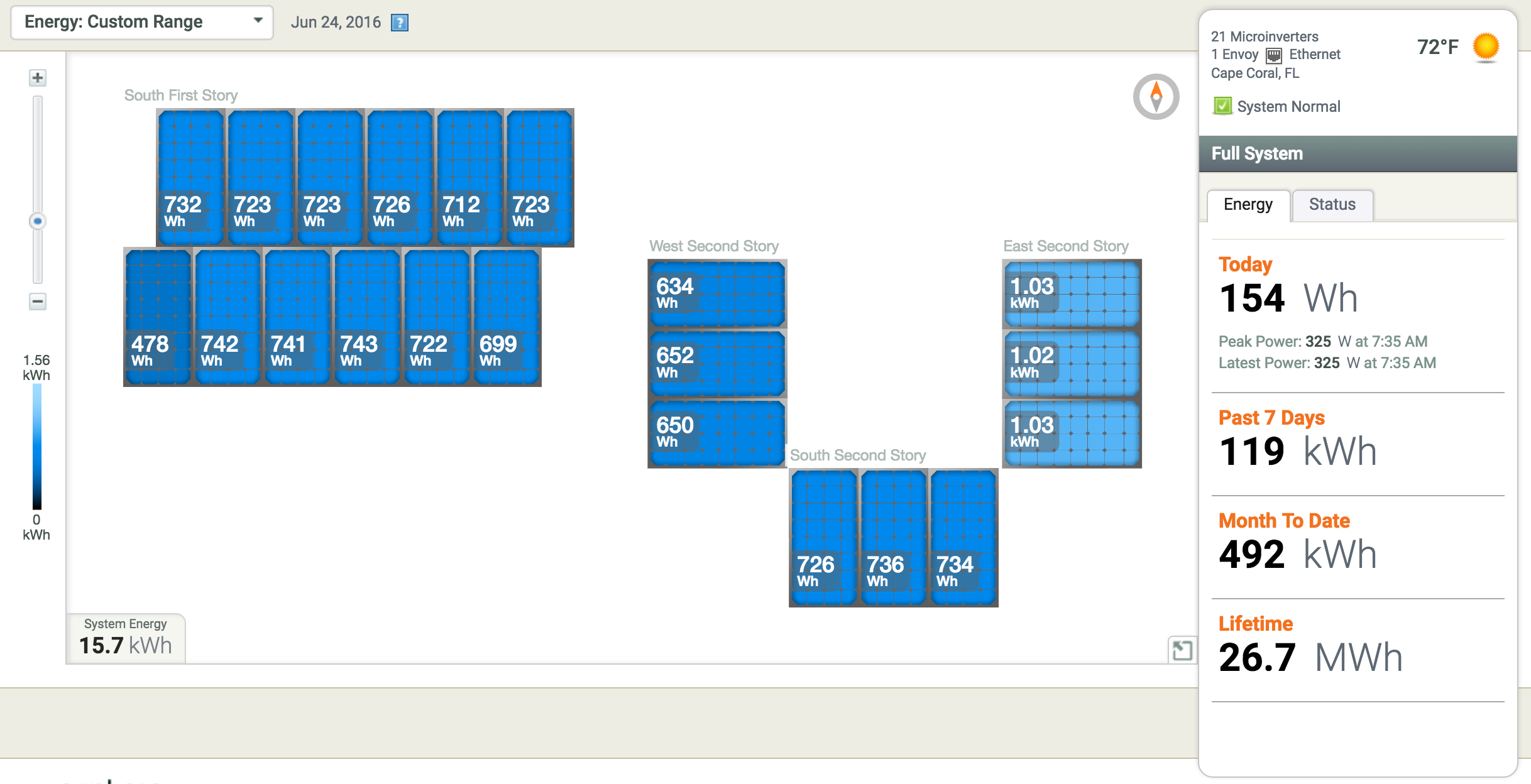
As you can see, the bottom left panel on the South First Story array is performing well below its neighboring panels. This could be due to shading or dust build-up – or it could be a sign of a defect or installation error.
Regardless, decreased production translates to a longer payback period and lower return on investment, and a real-time digital monitoring system can help you identify and resolve issues quickly.
How to make a solar panel warranty claim
If you notice a visible defect or performance issue with one of your solar panels, your first move is to call your installer. Do NOT handle the panel or try to fix the issue yourself, as this can void your warranty.
Your installer will perform an onsite and/or remote inspection of the panel to diagnose of the issue. If it stems from the manufacturer, they will help you make a claim and prepare the necessary documents and photographs.
This is why it is so important to work with established and trusted installation companies. If you have an issue with your system and the installer is unresponsive or out of business, it is much more difficult to make warranty claims.
That’s why we require installers to have a minimum three years of experience (along with many other qualifications) to join the solar.com network.
The bottom line
As a long-term investment in energy savings and the ecosystem, it is crucial to protect your solar panels with robust manufacturer and installer warranties.
Manufacturers typically offer two types of solar panel warranties: Product and performance. Together, these protect you from panel defects and ensure your panels are able to perform at a certain level throughout their life.
Installer warranties protect you from damages and errors during the installation process.
It’s important to have a real-time digital monitoring system to catch performance issues in your solar panels. If an issue does arise, contact your installer to identify the cause and , if necessary, prepare a warranty claim.
Solar panel warranty FAQs
Do solar panels void roof warranty?
No, a quality solar installation should not void your roof warranty. In fact, some companies provide both roofing and solar installation services and provide warranties for both.
However, it is very important to go through an experienced, reputable solar company that uses quality equipment and installation techniques. Inexperienced and careless installers can do damage that will void your roof warranty – and may not be around to clean up their mess.
Are solar panel warranties transferable?
In most cases, solar panel warranties are transferable to the new owner in a home sale. However, some warranties are restricted to the original owner, so it is crucial to clarify this point with the manufacturer and installer offering the warranty.
As soon as you know you are selling your home, contact your solar installer and the solar panel manufacturer to make them aware and start the process of transferring your warranty.
Do home warranties cover solar panels?
If your solar panels are attached to your roof, they may be included in the dwelling coverage your homeowners insurance policy. If the panels are ground-mounted or intsalled on a detached structure (like a shed or garage), they may be included in “other structures” coverage.
Each policy is different, so it is critical to check with your homeowners insurance provider to see if your panels can be insured. Your homeowners insurance is a great way to protect your panels for natural disasters and “Acts of God” that aren’t covered by manufacturer and installer warranties.
If your homeowners insurance doesn’t cover your solar panels, it may be worth looking into specific solar panel insurance to protect your investment.






